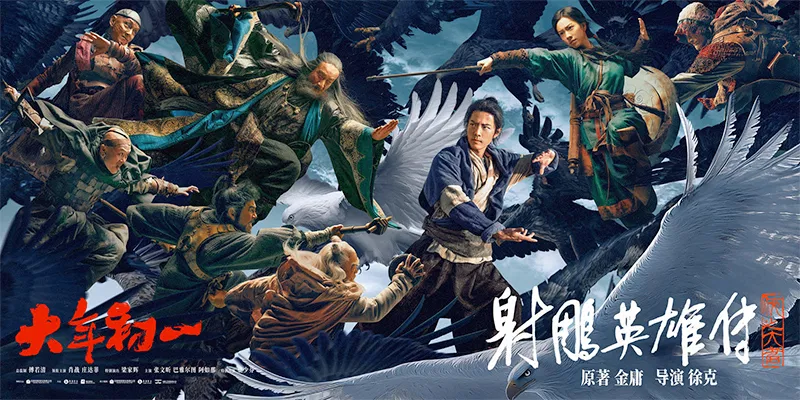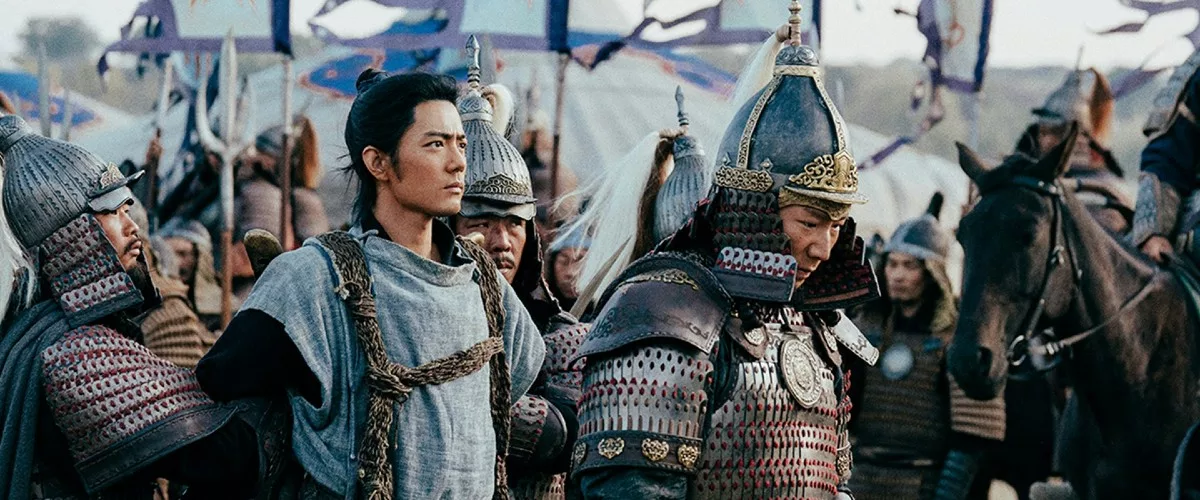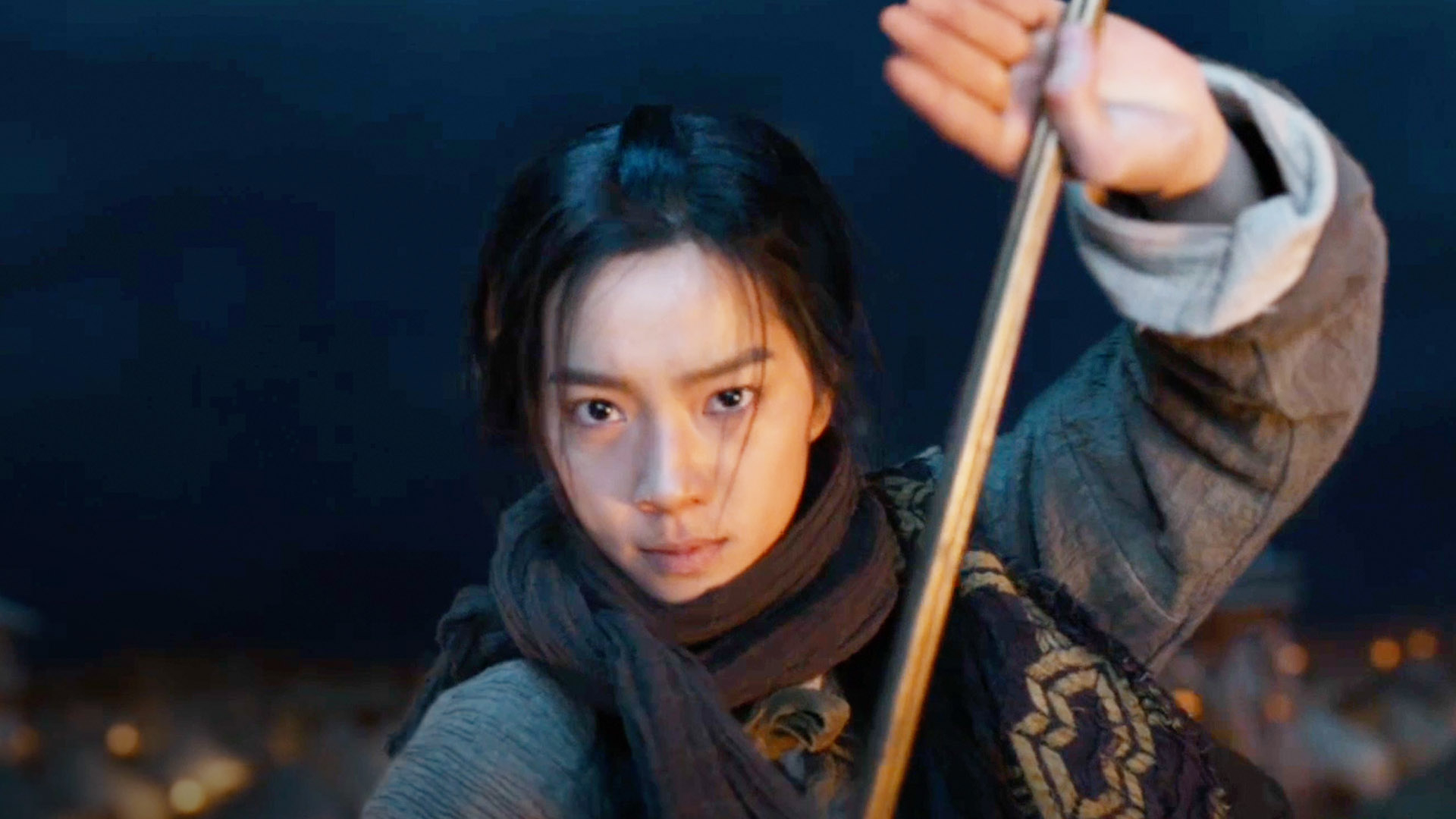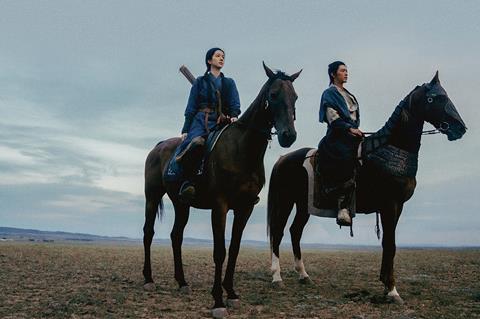In the vast landscape of Chinese cinema, certain stories transcend time and generation. Legends of the Condor Heroes: The Gallants is one such tale—a 2025 martial arts epic that captures the essence of Jin Yong's beloved wuxia novel while introducing it to a new generation of viewers. Directed by the legendary Tsui Hark and starring the charismatic Xiao Zhan, this film promises to be more than just another kung fu movie; it's a heartfelt exploration of honor, love, and what it truly means to be a hero.
For those unfamiliar with Jin Yong's work, imagine a world where martial arts isn't just about fighting—it's about philosophy, loyalty, and the eternal struggle between good and evil. This latest adaptation takes us on a journey through 13th century China, where young Guo Jing must navigate love, war, and his destiny as a martial arts master.

The Story Behind the Legend
What makes Legends of the Condor Heroes: The Gallants particularly fascinating is how it focuses on a specific portion of Jin Yong's epic novel—chapters 34 through 40 to be precise. Rather than attempting to cram an entire literary masterpiece into one film, Tsui Hark wisely chose to concentrate on a crucial period in Guo Jing's development. This approach allows for deeper character exploration and more meaningful storytelling.
The plot centers around Guo Jing, portrayed by Xiao Zhan, a young martial artist who was raised among the Mongols after his father's death. The story follows his journey as he wanders in search of his beloved Huang Rong (Zhuang Dafei), all while the larger conflict between the Jin dynasty and the Mongol khanate rages around them. It's a personal story set against the backdrop of historical upheaval—the kind of storytelling that Jin Yong excelled at.
What struck me most about this adaptation is how it manages to balance the intimate character moments with the grand spectacle that audiences expect from a Tsui Hark film. The director, known for his innovative approach to action cinema, brings his decades of experience to bear on this project, creating something that feels both familiar and fresh.
Xiao Zhan's Transformative Performance
Let's talk about Xiao Zhan's performance as Guo Jing—it's honestly the heart of this entire film. Coming from his background in television dramas, many wondered if he could carry a big-budget martial arts epic. The answer is a resounding yes. Xiao Zhan brings a genuine earnestness to Guo Jing that makes the character instantly relatable, even when he's performing impossible martial arts feats.
What I found particularly compelling about his portrayal is how he captures Guo Jing's essential nature—honest, determined, and slightly naive in the most endearing way. This isn't the typical stoic martial arts hero we're used to seeing. Instead, Xiao Zhan gives us a young man who's still figuring out his place in the world, someone who stumbles and grows throughout his journey.
The supporting cast, including Zhuang Dafei as the clever and spirited Huang Rong, creates a wonderful ensemble that brings depth to every scene. Their chemistry is palpable, making their romantic subplot feel genuine rather than forced. Even Baya'ertu's portrayal of Genghis Khan adds layers of complexity to what could have been a simple antagonist role.

The Artistry of Martial Arts Cinema
One aspect that truly sets this film apart is its approach to martial arts choreography. Tsui Hark has always been known for pushing the boundaries of what's possible in action cinema, and The Gallants continues that tradition. The fight sequences aren't just displays of physical prowess—they're emotional expressions of the characters' inner conflicts and growth.
The film's martial arts sequences draw from traditional Chinese fighting styles while incorporating modern filmmaking techniques. You'll see everything from the graceful movements inspired by classical wushu to the raw, visceral combat that reflects the harsh realities of medieval warfare. Each fight scene serves the story, rather than existing purely for spectacle.
What's particularly impressive is how the film handles the more fantastical elements of wuxia—the gravity-defying leaps, the internal energy manipulation, the mystical martial arts techniques. Rather than making these elements feel ridiculous, Tsui Hark grounds them in the emotional reality of the characters and the historical context of the story.
Historical Context and Cultural Significance
One of the most interesting aspects of Legends of the Condor Heroes: The Gallants is how it weaves historical events into its narrative. The film is set during the Song Dynasty (1127-1279), a period of significant upheaval in Chinese history. The Mongol invasions weren't just background noise—they fundamentally changed the course of Chinese civilization.
Jin Yong was masterful at using these historical events as a backdrop for his stories, and this adaptation honors that tradition. The film doesn't shy away from the complexity of this period, showing how ordinary people were caught up in the larger currents of history. Guo Jing's struggle to choose between his Mongol upbringing and his Chinese heritage reflects the broader cultural tensions of the era.
The production design deserves particular praise for bringing this historical period to life. From the sweeping Mongolian steppes to the intricate architecture of Song dynasty cities, every frame feels meticulously researched and beautifully realized. The costumes, weapons, and sets all contribute to creating a world that feels both authentic and cinematic.
Tsui Hark's Directorial Vision
Tsui Hark's involvement in this project was always going to be the make-or-break factor, and I'm happy to report that his vision elevates the material considerably. Known for films like "Once Upon a Time in China" and "Detective Dee," Hark brings his signature style to this adaptation while respecting the source material's spirit.
His approach to pacing is particularly noteworthy. Rather than rushing through plot points, he allows scenes to breathe, giving characters time to develop and relationships time to evolve. This is crucial in a wuxia film, where the emotional stakes are just as important as the physical ones.
The director's use of practical effects combined with modern CGI creates action sequences that feel both spectacular and grounded. You never lose sight of the human element in the midst of all the spectacle, which is a testament to Hark's skill as a filmmaker.
What Works and What Doesn't
Let me be honest—no film is perfect, and The Gallants has its share of challenges. The most significant issue is the film's pacing in the middle act, where the plot occasionally feels rushed. With so much source material to draw from, some story elements feel compressed, leaving you wanting more development in certain areas.
However, these minor pacing issues don't detract from the overall experience. The film's strengths far outweigh its weaknesses. The emotional core of the story remains intact, the action sequences are genuinely thrilling, and the performances across the board are solid.
What particularly impressed me was how accessible the film is to newcomers to the wuxia genre. You don't need extensive knowledge of Jin Yong's novels or Chinese history to follow and enjoy the story. The film does an excellent job of providing context without feeling expository or heavy-handed.
The Legacy of Jin Yong Adaptations
Jin Yong's novels have been adapted countless times across different media, from television series to films to video games. Each adaptation brings something unique to the table, but what sets The Gallants apart is its focus on character development over pure spectacle.
Previous adaptations have sometimes fallen into the trap of prioritizing action over story, but this film strikes a better balance. The martial arts sequences serve the character arcs, the romance feels genuine, and the historical context adds depth rather than confusion.
For fans of the novels, this adaptation respects the source material while making necessary changes for the cinematic medium. For newcomers, it provides an excellent entry point into Jin Yong's world of martial arts and honor.

International Appeal and Distribution
One of the most exciting aspects of this release is Sony Pictures' acquisition of worldwide distribution rights. This means that Legends of the Condor Heroes: The Gallants will reach audiences far beyond China, potentially introducing Jin Yong's work to a global audience.
The film's themes of honor, love, and sacrifice are universal, making it accessible to international audiences while maintaining its distinctly Chinese character. The high production values and spectacular action sequences should appeal to fans of martial arts cinema worldwide.
This international distribution also represents a significant moment for Chinese cinema, showing that well-made wuxia films can find audiences globally when they focus on strong storytelling and character development.
Technical Excellence
From a technical standpoint, The Gallants is impressive across the board. The cinematography captures both the intimate character moments and the sweeping epic scope with equal skill. The use of natural lighting and practical locations gives the film an authentic feel that CGI-heavy productions sometimes lack.
The sound design deserves particular mention, especially in the martial arts sequences. Every sword clash, every footstep, every whispered conversation feels precisely placed and purposeful. The musical score, while respectful of traditional Chinese instrumentation, never feels intrusive or overly sentimental.
The editing is clean and purposeful, allowing the action to flow naturally while maintaining narrative clarity. In an era where many action films rely on rapid-fire editing to create excitement, The Gallants trusts its choreography and performances to carry the scenes.
Cultural Impact and Modern Relevance
What makes Legends of the Condor Heroes: The Gallants particularly relevant today is its exploration of identity and belonging. Guo Jing's struggle to reconcile his Mongol upbringing with his Chinese heritage resonates in our increasingly globalized world, where questions of cultural identity are more complex than ever.
The film's emphasis on traditional values—loyalty, honor, sacrifice for the greater good—provides a counterpoint to the cynicism that often pervades modern cinema. These aren't naive or simplistic presentations of morality, but rather thoughtful explorations of what it means to be a hero in a complicated world.
The portrayal of different cultures within the film is also noteworthy. Rather than presenting a simplistic good-versus-evil narrative, the film shows the complexity of historical conflicts and the humanity on all sides. This nuanced approach adds depth to the storytelling and relevance to contemporary audiences.
For Newcomers to Wuxia
If you're new to the wuxia genre, Legends of the Condor Heroes: The Gallants serves as an excellent introduction. The film includes enough context to understand the world and its rules without overwhelming newcomers with exposition. The character of Guo Jing himself serves as a surrogate for the audience, learning about this world as we do.
Here are some things to keep in mind as you watch:
- Wuxia stories often blend historical events with fantasy elements—this is part of the genre's charm
- The martial arts techniques shown are stylized and symbolic, representing the characters' inner strength and moral development
- Concepts like "qi" (internal energy) and mystical martial arts abilities are standard elements of the genre
- The emphasis on honor, loyalty, and sacrifice reflects traditional Chinese values and philosophical concepts
Don't worry if everything doesn't make complete sense immediately—wuxia is a genre that rewards patience and open-mindedness.

The Verdict
So, is Legends of the Condor Heroes: The Gallants worth your time? Absolutely. While it may not be perfect, it's a genuinely entertaining and emotionally engaging film that honors its source material while creating something fresh for modern audiences.
Xiao Zhan's performance alone makes the film worth watching, but when combined with Tsui Hark's direction, strong supporting performances, and spectacular production values, you get a martial arts epic that satisfies on multiple levels.
The film succeeds in what it sets out to do: tell a compelling story about growth, love, and heroism set against the backdrop of one of the most turbulent periods in Chinese history. It's a film that respects its audience's intelligence while delivering the spectacle they expect from a big-budget martial arts movie.
Where and How to Watch
Thanks to Sony Pictures' worldwide distribution, Legends of the Condor Heroes: The Gallants is playing in select theaters across North America and other international markets. For the full experience, I'd recommend seeing it on the big screen if possible—the sweeping landscapes and intricate fight choreography deserve to be seen in all their glory.
The film is also expected to be available on various streaming platforms, though specific details about digital release dates haven't been confirmed yet. Keep an eye on Sony Pictures' official channels for the most up-to-date information about availability in your region.
Final Thoughts: A Bridge Between Worlds
Legends of the Condor Heroes: The Gallants represents something special in modern cinema—a film that successfully bridges the gap between traditional storytelling and contemporary filmmaking techniques. It proves that there's still an audience for stories about honor, sacrifice, and the journey from youth to maturity.
In a world where many big-budget films feel calculated and focus-grouped to death, there's something refreshing about a movie that wears its heart on its sleeve. This film believes in its characters and their journey, and that belief is infectious.
Whether you're a longtime fan of Jin Yong's work, a martial arts movie enthusiast, or simply someone looking for a well-crafted adventure story, The Gallants has something to offer. It's a reminder of why we fell in love with movies in the first place—for their ability to transport us to other worlds and make us believe in the power of heroism.
So grab some popcorn, settle in, and prepare to be transported to a world where martial arts isn't just about fighting—it's about becoming the person you're meant to be. In the end, isn't that what all great stories are about?
Have you seen Legends of the Condor Heroes: The Gallants? Share your thoughts in the comments below, and don't forget to check out our other reviews of the latest martial arts films and Jin Yong adaptations!
